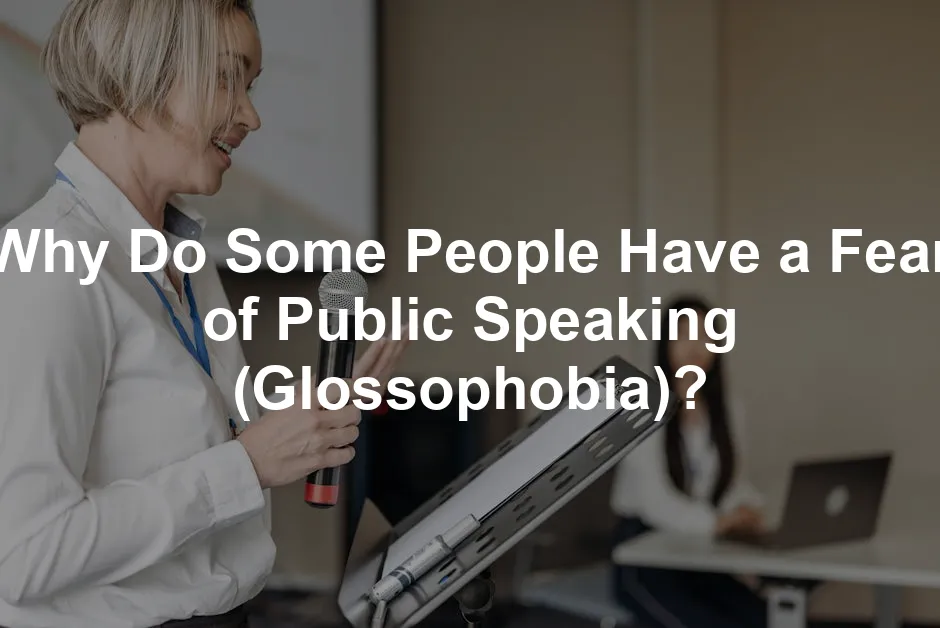
Why Do Some People Have a Fear of Public Speaking (Glossophobia)?
Introduction
Public speaking is a daunting task for many. In fact, glossophobia, the fear of public speaking, affects a large chunk of the population. Some studies suggest that up to 75% of people experience anxiety when asked to speak in front of others. This fear can be so debilitating that it steals opportunities from personal and professional lives. Imagine not being able to pitch your brilliant idea at work or share your thoughts in a classroom. Opportunities slip away like ice cream on a sunny day! Understanding glossophobia is essential. The goal here is to take a closer look at its causes, symptoms, and effective strategies to conquer this fear. Whether it’s the sweaty palms, racing heart, or the urge to flee, we’ll explore why these feelings arise and how to tackle them head-on! If you’re looking for a comprehensive guide to overcoming this fear, check out Public Speaking for Dummies. It’s an excellent starting point for anyone wishing to master the art of speaking!
Understanding Glossophobia
What is Glossophobia?
Glossophobia refers to the intense fear of public speaking. It falls under the umbrella of social anxiety disorders, which can be quite crippling. According to various sources, about 15-40% of the population grapples with this fear. It’s not just the anxiety of speaking; it’s the overwhelming dread of being judged or embarrassed in front of others.How Does Glossophobia Feel?
When faced with a speaking engagement, individuals often experience a whirlwind of physical and emotional symptoms. Picture this: heart racing like a runaway train, palms clammy enough to rival a wet sponge, and an overwhelming urge to make a beeline for the door. Anticipatory anxiety kicks in long before the speech even starts. Thoughts spiral, imagining worst-case scenarios where everything that could go wrong does! The fear of embarrassment can be so intense that some folks actively avoid situations that require public speaking. This avoidance can lead to missed opportunities and increased anxiety over time. If you’re interested in learning techniques to conquer that anxiety, consider The Fearless Speaker, which provides actionable insights to help you speak with confidence. In essence, glossophobia can feel like being trapped in a rollercoaster ride you never wanted to board. The highs are exhilarating, but the fear of the plunge is paralyzing. Understanding these feelings is the first step toward overcoming them.
Causes of Glossophobia
Psychological Factors
Fear often wears a mask of past experiences. For many, glossophobia stems from negative encounters related to public speaking. Perhaps it was a school presentation that went south, resulting in red faces and harsh laughter. Those moments can linger, shaping future expectations. Each time someone prepares to speak, the mind often plays a highlight reel of past failures. It’s like a broken record, reminding them of everything that could go wrong. Soon, the fear of humiliation overshadows the excitement of sharing ideas. If you want to delve deeper into the psychology of public speaking, check out How to Win Friends and Influence People. This classic book can help you navigate social situations with ease! Perfectionism also plays a significant role in this anxiety. The pressure to deliver a flawless performance can be overwhelming. When individuals believe that anything less than perfect is unacceptable, anxiety levels soar. They start fearing judgment from audience members, worrying that even a small fumble will lead to ridicule. This fear of scrutiny can tighten the throat and freeze the tongue, making public speaking feel like an Everest-sized challenge.Biological and Genetic Factors
Genetics might hold some answers to why certain individuals are more prone to glossophobia. Research suggests a hereditary link to social anxiety disorders. If someone has a family history of anxiety, they may be more susceptible to similar fears. Think of it as inheriting the family recipe for anxiety. Moreover, brain physiology contributes to these fears. The amygdala, that tiny almond-shaped structure in the brain, plays a pivotal role in processing fear. When it perceives a threat, it sets off the body’s alarm system. This response can lead to physical symptoms like increased heart rate and sweating, making the act of speaking in public feel like a life-or-death situation. It’s no wonder that the thought of addressing a crowd sends chills down many spines! If you’re looking to understand and overcome these biological barriers, consider The Anxiety and Phobia Workbook for practical coping strategies.
Environmental Influences
Upbringing and environment significantly shape one’s confidence in public speaking. Critical parenting can instill a fear of failure early on. Imagine a child constantly told they are “not good enough.” These messages can echo in their minds for years. Such experiences can lead to self-doubt and trepidation in later life, especially when it comes to speaking in front of others. Societal pressures further amplify public speaking fears. In cultures that highly value success and performance, the stakes seem higher. This can create an environment where mistakes are unforgivingly magnified. For instance, in professional settings, the fear of being judged by colleagues can make even the most practiced speakers feel like deer caught in headlights. The thought of misstepping can feel paralyzing, leading to avoidance of speaking opportunities altogether. In conclusion, glossophobia is influenced by a complex interplay of psychological, biological, and environmental factors. Understanding these causes can be the first step in addressing and overcoming this common fear. With awareness, individuals can start to dismantle the barriers that keep them from sharing their voices. If you want to enhance your speaking skills, consider reading The Art of Public Speaking. It’s a great resource for mastering the nuances of effective communication.
Preparation Techniques
1. Practice
Practice is your best friend when it comes to public speaking. The more you rehearse, the more comfortable you’ll become. Think of practice as your secret weapon. Not only does it build confidence, but it also helps you know your material inside and out. Try rehearsing in front of a mirror. You’ll not only see your facial expressions but also practice your gestures! Alternatively, record yourself. Play it back and notice areas for improvement. Watching yourself may feel odd, but it’s a great way to catch those pesky filler words before they sneak into your speech. If you’re looking for a structured approach to practice, consider using a Public Speaking Workbook to guide your preparation.
2. Use of Notes
When it comes to speaking, less can be more. Instead of writing out a full script, consider bullet points. This method gives you the freedom to speak naturally while still keeping you on track. Bullet points serve as your guiding stars, reminding you of key concepts without locking you into a rigid structure. This allows for a conversational tone, which is often more engaging. Plus, if you lose your train of thought, you can glance down and quickly regain your footing. To help you stay organized, a Notepad for Speech Notes can be incredibly useful.
3. Visualization Techniques
Your mind is powerful! Use it to your advantage by visualizing success. Picture yourself standing confidently in front of your audience, delivering your speech with charisma and poise. Imagine the audience nodding, smiling, and applauding at the end. This positive imagery can significantly reduce anxiety. When your mind is filled with images of success, it’s less likely to focus on the embarrassing “what-ifs.” Make visualization a part of your preparation, and watch your confidence soar! You might also want to create a Journal for Reflecting on Speaking Experiences to track your progress.
Relaxation Techniques
1. Breathing Exercises
Deep breathing is like hitting the reset button for your nerves. Before stepping on stage, take a moment to breathe. Inhale deeply through your nose, letting your abdomen expand. Hold for a few seconds, then exhale slowly through your mouth. This technique calms your nervous system and reduces symptoms like sweating and racing hearts. Practicing this in low-stress situations will help make it second nature when you’re facing an audience. If you want to learn more about effective breathing techniques, consider Breathing Techniques for Stress Relief.
2. Mindfulness and Meditation
Mindfulness can be a game-changer for managing public speaking anxiety. By focusing on the present moment, you can reduce feelings of anxiety and stress. Try incorporating meditation into your daily routine. Even a few minutes can help clear your mind and bring you peace. Consider guided meditation apps or simply sit in a quiet space, focusing on your breathing. When combined with public speaking, mindfulness helps you stay grounded and present, making it easier to connect with your audience. You might find Guided Meditation for Public Speaking particularly helpful.
Joining Support Groups
Joining a support group can work wonders for overcoming glossophobia. Organizations like Toastmasters are fantastic for this! They provide a friendly, encouraging atmosphere where you can practice public speaking without the pressure of judgment. It’s like going to a gym, but instead of lifting weights, you’re lifting your confidence! You can get started with the Toastmasters International Membership Kit to kick off your journey. Being part of a group allows you to share experiences with others who understand your fears. You’ll find that many participants share your apprehensions. Peer support is crucial. It helps normalize the fear and reinforces the idea that you’re not alone in this struggle. Toastmasters meetings feature prepared speeches, impromptu speaking opportunities, and constructive feedback. You’ll slowly build your skills and confidence, transforming from a nervous wreck into a confident speaker. Plus, the friendships you form along the way can make the journey even more enjoyable!
Real-Life Experiences
Let’s take a moment to hear from those who’ve faced glossophobia and emerged victorious. Meet Sarah, a marketing executive who once feared even the thought of speaking in front of her team. At her first meeting, she was so nervous that she almost bolted out the door! Instead, she took a deep breath, clutched her notes, and delivered her presentation. The applause that followed was like music to her ears. If you’re looking for inspiration, consider reading The Confident Speaker. It’s packed with tips to help you shine! Sarah recalls, “It felt like I had just conquered Mount Everest! I realized that my colleagues were supportive, not judgmental. That experience ignited a fire within me.” With each presentation, her confidence grew, and soon she was leading meetings and brainstorming sessions. Then there’s Jake, a college student who dreaded giving a class presentation. He joined a local Toastmasters club and embraced the challenge. At first, he struggled, stumbling over words and losing his train of thought. But with every speech, he learned to embrace the awkwardness and laugh at himself. His classmates began to notice his progress too. “Now, I look forward to speaking,” Jake says, flashing a grin. “It’s not just about the speech; it’s about sharing ideas and connecting with people.” If you want to motivate yourself further, consider getting some Motivational Wall Art for Home Office to inspire you daily!
Conclusion
In conclusion, glossophobia is a common fear that many individuals face. Whether it stems from past experiences, perfectionism, or societal pressures, it’s important to remember that you are not alone. Strategies such as joining support groups, practicing relaxation techniques, and sharing personal experiences can significantly help in managing and overcoming this anxiety. If you want to further your skills, consider The Quick and Easy Way to Effective Speaking—it’s a fantastic resource! The road to conquering glossophobia may be challenging, but it is absolutely manageable. With time, support, and practice, anyone can transform their fear into confidence. So, take that first step! Seek help, practice your strategies, and embrace the journey. You might just find that speaking in public is not as terrifying as it once seemed. After all, your voice deserves to be heard!
FAQs
What is glossophobia?
Glossophobia is the fear of public speaking. It’s not just a case of stage fright; it’s a serious anxiety disorder that affects many people. Studies suggest that about 15-40% of the population experiences this fear. For those affected, speaking in front of others can lead to physical symptoms like sweating, trembling, and a racing heart. The anxiety can be so overwhelming that it interferes with personal and professional opportunities. Imagine having a brilliant idea but feeling paralyzed when asked to share it!
What causes glossophobia?
Glossophobia can stem from a mix of psychological, biological, and environmental factors. Psychologically, negative past experiences can create a fear of judgment. If someone flubbed a speech in school, they might dread similar situations in the future. Biologically, genetics play a role too. A family history of anxiety can increase susceptibility. The amygdala, a brain region linked to fear responses, can also heighten anxiety during public speaking. Environmentally, critical parenting or societal pressures can escalate these fears. Together, these factors create a perfect storm for public speaking anxiety.
How can I overcome glossophobia?
Overcoming glossophobia is entirely possible with the right strategies. Cognitive Behavioral Therapy (CBT) is an effective treatment, helping restructure negative thoughts and confront fears. Practice is essential; the more you speak, the more confident you become. Techniques like rehearsing in front of a mirror or using bullet points instead of a full script can aid in preparation. Relaxation techniques, such as deep breathing exercises and mindfulness, can help calm those racing hearts. Joining support groups like Toastmasters can also provide a friendly environment to practice.
Are there any medications for glossophobia?
Yes, medications can be used to help manage glossophobia, particularly when anxiety is severe. Beta-blockers are often prescribed to control the physical symptoms, like shaking and rapid heartbeat. Anti-anxiety medications can alleviate feelings of panic. However, it’s crucial to consult with a healthcare provider to find the most suitable approach. Medication is typically most effective when combined with therapy, providing a comprehensive strategy for tackling public speaking fears.
Is glossophobia different from general anxiety about public speaking?
Absolutely! While many people feel nervous about public speaking, glossophobia is a diagnosable phobia. It involves intense, persistent fear that significantly interferes with daily life. Those with glossophobia experience overwhelming anxiety, leading to avoidance of speaking situations altogether. In contrast, occasional nerves might cause a bit of discomfort but don’t prevent someone from speaking when necessary. Understanding this distinction is key to addressing the fear effectively and seeking appropriate help.
Understanding the fear of public speaking is crucial for those who want to improve their communication skills. Why do some people have a fear of public speaking (glossophobia)
All images from Pexels




